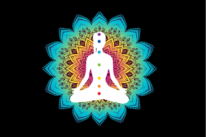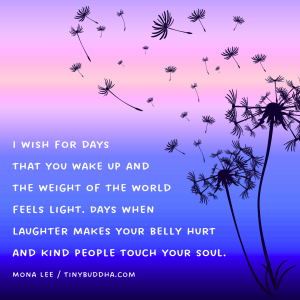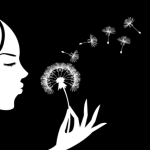
Update: The winners for this giveaway have been chosen. They are: Marsha Law and Talya Price.
I experienced my first bout of depression at twelve years old, and by seventeen I so frequently felt despondent that my boyfriend questioned if I could go one day without crying. I could not.
My life became a series of self-destructive habits, from binging and purging, to drinking, to cutting myself—the first two to numb my feelings, and the last to feel something, a pain of my own choosing, which somehow felt like relief.
In my senior year of high school, I was prescribed medication—and then another, and another, and another after that.
At one point, I took seven different daily pills, some to offset the side effects of others. Sure, I didn’t feel as depressed, but that’s because I rarely felt anything. I now had bulimia in pill form, because quite frequently, I was numb.
I may have been treating the symptoms, but I wasn’t addressing the root cause—at least not effectively. I was in therapy, but I believed my depression was chemical, and that there was no hope of relief without antidepressants, mood stabilizers, and tranquilizers.
It certainly didn’t help that someone in my life (whose actions likely contributed to my depression) would frequently say, “What’s wrong? Forget your meds?” whenever I expressed healthy, normal emotions in response to mistreatment.
But that was my lesson to learn—that it was okay to feel my feelings, and if I did, I could learn from them what really caused my depression.
While I still experience sadness from time to time, as we all do, I have been medication-free for over seven years, and I have a number of tools—including meditation, deep breathing, and physical exercise—that help me stay relatively balanced and emotionally healthy.
I know that everyone’s experience is different, and I also believe medication can serve a purpose in treating mental illness. Please know that I am not suggesting that no one should be on medication, and that anyone who is should stop taking it cold turkey.
But I believe we are vastly overmedicated, on the whole, and often at the expense of treating the underlying issues that lead to depression.
And I believe this is because it’s most profitable to treat depression in pill form, and to convince people they have a chemical imbalance that will need lifelong pharmaceutical treatment.
But there are other options—and one pioneer in the field, Jonathan Robinson, has dedicated his career to helping people learn to utilize them.
In this interview, he shares a little about his latest book, Find Happiness Now, and his new program, From Sad to Glad: How to Overcome Stress, Anxiety, and Depression and Feel Happy Again.
This interview contains a giveaway. To enter to win one of two free copies of Find Happiness Now, leave a comment below sharing something that always helps improve your mood. For an extra entry, tweet or Facebook the following:
Learn how to treat depression w/out medication & enter to win a free copy of Find Happiness Now by Jonathan Robinson http://bit.ly/11cgqdm
You can enter until Thursday, November 20th at 12:00AM.
Before you read any further, I’d like to once again highlight what I wrote above: I know that everyone’s experience is different, and I also believe medication can serve a purpose in treating mental illness. I am not suggesting that no one should be on medication, and that anyone who is should stop taking it cold turkey.
I’m merely presenting an alternative approach, as I wish this information had been available to me years ago.
1. I know that you’ve reached over 250 million people through your work, and that you’ve spent over three decades studying the most practical and powerful methods for personal development. What originally motivated you to pursue this kind of work?
I was fortunate to have grown up in a highly dysfunctional and violent family. I say “fortunate” because, by age twelve, I was severely depressed by my life’s circumstances.
I started to look for anything that might help me deal with the pain and violence I was surrounded by. I turned to self-help books, and through such books, I found hope that my life could be made better if I did something different. After all, I couldn’t change my family, but I could change myself.
By age thirteen, I was into hypnosis, meditation, and reprogramming my subconscious. I guess you could say I had an early mid life crisis, and once I saw that certain methods really worked, I ended up making a career of teaching others what I had learned.
2. In your latest book, Find Happiness Now, you share fifty ways we can bring more love, joy, and balance into our lives. Can you share some of the simplest tools from your book—things anyone can do every day to increase their joy?
Different methods work for different types of people. That’s why I offer a lot of methods. However, studies show that some techniques work for almost everyone. For example, performing an act of kindness for a stranger or a friend immediately boosts your own level of happiness.
Also, I encourage people to schedule time each week to do activities that make them feel wonderful. That might be a walk with a friend or time to go out dancing. In this crazy busy age we live in, sometimes people forget to do what truly brings them joy.
By scheduling quality time and experiences each week, it helps us to be our best. As for me, one of my favorite things to do is to think of three things each day that I could feel grateful for. I also like to rub my dog’s belly and tell her how much I love her. She likes it too.
3. You recently launched a powerful program called “From Sad to Glad: How to Overcome Stress, Anxiety and Depression and Feel Happy Again.” Can you tell us a little about the program and what makes it unique?
Sure. It ends up that about 10% of the U.S. population is on antidepressants—despite the fact that studies show that these medications work no better than placebos for the vast majority of users.
In addition, they have plenty of negative side effects, they cost a lot, and are bad for your long-term health. Therefore, I teamed up with well-known physician Dr. Emmett Miller to create a program for helping people overcome stress, anxiety, and depression without having to take medications.
In the program, we offer all the best scientifically proven methods that help people to immediately feel better. The program is very holistic, meaning we provide people with methods for their mind, body, spirit, and relationships.
We even suggest a lot of healthy supplements people can take that really work, and methods that can be done in under a minute a day that can dramatically improve your mood.
It is the only holistic home study course for easily overcoming stress, anxiety, and depression in a simple, step-by-step manner.
4. It’s interesting to see both “sad” and “depression” within the program name, since many people would say that there’s a big difference between being sad and depressed. Can you tell us what differentiates the two?
Sadness happens to everyone from time to time. We each face loss and various challenges, and sadness is often a normal and healthy reaction to such difficulties. Yet, when a person is sad for a long time, and/or has a hard time functioning effectively due to how they feel, you can say that depression has set in.
Depression is sometimes triggered by challenges, but sometimes its causes are not so clear. When a person becomes depressed, it’s important that they seek help—or else their health, relationships, finances, and day-to-day life will continue to suffer, or perhaps even get worse.
5. In your experience, what have you found to be the most common causes of depression?
Depression is often triggered by a stressful life event, such as the death of a loved one, a divorce, or even something like the loss of a job. Or one might have a genetic predisposition, or a hidden health challenge that can lead to depression. Often, there are many factors that lead to depression, which is why antidepressants tend to not be an effective long-term treatment for people.
In the “From Sad to Glad” program, we attend to the six most common factors that lead to depression—so that one’s recovery from it can be faster and more lasting.
6. How do Americans rate in terms of depression compared to other nations, and why do you think so many Americans are on antidepressants?
Americans seem to be rated #1 or #2 of industrialized nations in being depressed. I think this is partly due to the breakdown of family and community, and that our ways of dealing with depression are largely ineffective.
Drug companies spend billions of dollars in marketing, convincing us that the best way to overcome depression is with antidepressants. When given the choice between a pill or just being depressed, people choose a pill—even if that pill is mostly ineffective, expensive, and has nasty side effects.
That’s why it’s important that people become aware of effective methods for overcoming depression that don’t require medications.
7. How did you come across the methods described in the program, and how effective are they?
Dr. Miller and I came across our approach to depression and anxiety by working with thousands of people and seeing what worked, as well as reading about effective methods in journals and self-help books. Also, in our younger years, both Dr. Miller and I suffered from depression, so we saw what worked for ourselves.
As I mentioned before, different techniques work for different types of people, but research indicates that various methods that we detail in our “From Sad to Glad” program have a higher rate of success than medications.
For example, high rates of success have been found for overcoming anxiety and depression using CBT (Cognitive Behavioral Therapy), as well as specific supplements and certain types of exercise.
When you use more than one approach at a time (as we suggest), the success rates tend to be even higher, and results tend to be even faster.
8. Can you share one of the methods that people have found to be the most helpful?
There are so many methods that it’s hard to choose just one. Yet, some of my favorite methods are ones that take under a minute to do.
For example, we have guided meditations that can help people immediately tap into feelings of energy, confidence, and passion.
In one of our guided meditations, we have listeners focus on a person, child, or animal they have great affection for, and have them focus on times they felt great care and appreciation for this being.
By giving people an experience of love and affection, the feelings of sadness, anxiety, and depression can often quickly melt away.
9. I know you’ve interviewed some inspiring people in doing research for some of your books. What did you learn from your interview with the Dalai Lama about happiness?
The Dalai Lama said something that really struck me. He said, “Kindness is my religion.” He also said, “Happiness is our birthright. The purpose of life is to be happy.”
Some people think happiness is a selfish thing, but research shows that happy people are the most giving and productive people in the world. It’s hard to be a good partner, parent, or employee if you don’t feel good. Therefore, I think it’s key that people learn how to be happy, and from their happiness, they can better spread their kindness and good feelings to others.
10. What is the most important thing you want people to get from your program?
I want people to get that with the right ideas and methods, anyone can learn to naturally overcome their anxiety and depression and feel better. In addition, I want folks to know that by working on themselves, they’ll be helping everyone they care about to become happier and healthier as well.
You can find Jonathan’s book, Find Happiness Now, on Amazon, and learn more about his program, From Sad to Glad here.
Happy woman throwing leaves image via Shutterstock
About Lori Deschene
Lori Deschene is the founder of Tiny Buddha. She started the site after struggling with depression, bulimia, and toxic shame so she could recycle her former pain into something useful and inspire others do the same. She recently created the Breaking Barriers to Self-Care eCourse to help people honor their needs—so they can feel their best, be their best, and live their best possible life. If you’re ready to start thriving instead of merely surviving, you can learn more and get instant access here.
- Web |
- More Posts













 Though I run this site, it is not mine. It's ours. It's not about me. It's about us. Your stories and your wisdom are just as meaningful as mine.
Though I run this site, it is not mine. It's ours. It's not about me. It's about us. Your stories and your wisdom are just as meaningful as mine.